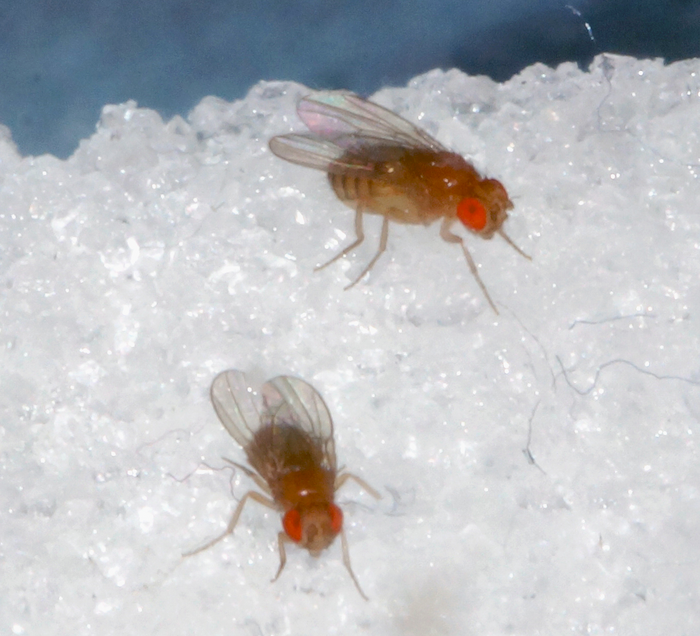Human beings and fruit flies have very little in common – at first sight. However, studying these flies it is in fact possible to find out more about human nature, particularly when it comes to depressive disorders. It is on this basis that scientists at Johannes Gutenberg University Mainz (JGU) are attempting to gain a better understanding of depression-like states and thus improve means of treating them. The results were published recently in the renowned journal Current Biology.

Credit: photo/©: Tim Hermanns
Human beings and fruit flies have very little in common – at first sight. However, studying these flies it is in fact possible to find out more about human nature, particularly when it comes to depressive disorders. It is on this basis that scientists at Johannes Gutenberg University Mainz (JGU) are attempting to gain a better understanding of depression-like states and thus improve means of treating them. The results were published recently in the renowned journal Current Biology.
Natural substances used in traditional Asian medicine could prove beneficial
“We have been looking at the effects of natural substances used in traditional Asian medicine, such as in Ayurveda, in our Drosophila fly model,” explained Professor Roland Strauss of the JGU Institute of Developmental Biology and Neurobiology (IDN). “Some of these could have an anti-depressive potential or prophylactically strengthen resilience to chronic stress, so that a depression-like state might not even develop.” The researchers intend, among other things, to demonstrate the efficacy of these substances, to identify their optimal formulations, and to isolate the actual active substances in pure form from the original plant material. In the long run, these might be marketed as drugs. But there is still a long way to go – after all, this is basic research.
“In the Drosophila model we can pinpoint exactly where these substances are active because we are able to analyze the entire signaling chain,” Strauss pointed out. “Furthermore, every stage in the signaling pathway can also be proven.” The researchers subject the flies to a mild form of recurrent stress, such as irregular phases of vibration of the substrate. This treatment results in the development of a depression-like state (DLS) in the flies, i.e., they move more slowly, do not stop to examine unexpectedly encountered sugar, and – unlike their more relaxed counterparts – are less willing to climb wide gaps. How does their behavior change when the flies receive the various natural substances? The results depend decisively on the preparation of each natural substance – for example, whether it has been extracted with water or alcohol.
Evening rewards can ameliorate depression
The research team has also discovered that if they reward the flies for 30 minutes on the evening of a stressful day, by offering them food with a higher sugar content than usual, or by activating the reward signaling pathway, this can prevent the development of a DLS. But what happens when the flies get a sugar reward? It was already known that the flies have sugar receptors on their tarsi, i.e., the lower part of their legs, and their proboscis, while the end of the signaling pathway at which serotonin is released onto the mushroom body had also been located. The mushroom body is a center for associative learning in flies, equivalent to the human hippocampus.
The researchers’ investigations showed that the pathway was considerably more complex than anticipated. Three different neurotransmitter systems have to be activated until the serotonin deficiency at the mushroom body, which is present in flies in a DLS, is compensated for by reward. One of these three systems is the dopaminergic system, which also signals reward in humans. In view of these findings, however, human beings should not assume that it would be a good idea to consume foods with a high sugar content accordingly. Flies perceive sweetness as a reward, whereas humans can achieve the same effect by other and more healthy means.
Boosting resilience by preventing depression
In addition, the researchers decided to look for resilience factors in the fly genome. Just like humans, Drosophila flies have an individual genetic make-up – no two flies are identical in this respect. For this reason, the team intends to find out whether and how the genomes of flies that are able to better cope with stress differ from those that develop a DLS in response to exposure to recurrent mild stress. The hope is that in the future it will be possible to diagnose genetic susceptibility to depression in humans – and then treat this with the natural substances that are also being investigated during the project.
Related links:
https://idn.biologie.uni-mainz.de/ – Institute of Developmental Biology and Neurobiology (IDN) at Johannes Gutenberg University Mainz
Read more:
https://www.uni-mainz.de/presse/aktuell/9199_ENG_HTML.php – press release “Memory research: Fruit flies learn their body size once for an entire lifetime” (21 Aug. 2019) ;
https://www.uni-mainz.de/presse/aktuell/4349_ENG_HTML.php – press release “Short-term memory in fruit flies shows age-related decline” (14 March 2018) ;
https://www.uni-mainz.de/presse/aktuell/562_ENG_HTML.php – press release “A backup copy in the central brain: How fruit flies form orientation memory” (7 March 2017)
Journal
Current Biology
DOI
10.1016/j.cub.2022.07.016
Article Title
Octopamine mediates sugar relief from a chronic-stress-induced depression-like state in Drosophila
Article Publication Date
31-Jul-2022




